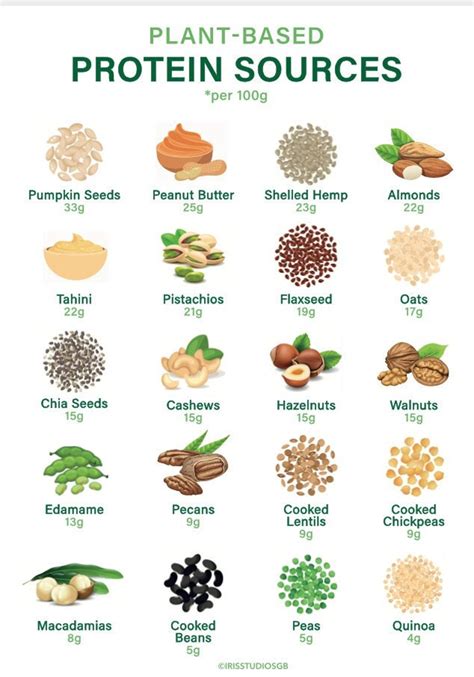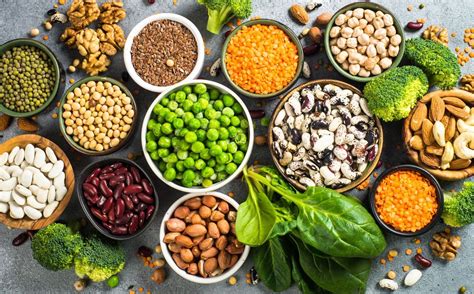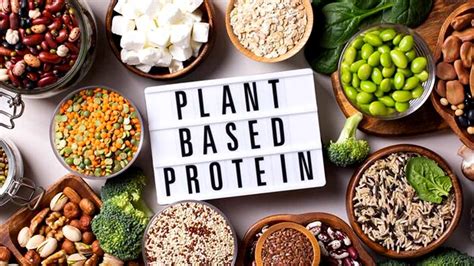Intro
Discover the power of plant-based protein options to boost your health. Learn how vegan protein sources like legumes, nuts, and seeds can help you build muscle, lose weight, and improve overall well-being. Explore the benefits of a plant-based diet and get expert tips on incorporating protein-rich foods into your daily meals.
As the world shifts towards a more health-conscious and environmentally aware lifestyle, the importance of plant-based protein options has become increasingly evident. With the rise of flexitarianism and veganism, people are now more than ever looking for alternative protein sources that are not only good for their health but also for the planet. Plant-based protein options have emerged as a game-changer, offering a wide range of benefits that can boost overall health and wellbeing.
The traditional notion that protein can only be obtained from animal sources has been debunked, and the scientific community has come to recognize the numerous advantages of plant-based protein. From reducing the risk of chronic diseases to promoting sustainable living, the benefits of plant-based protein are vast and varied. In this article, we will delve into the world of plant-based protein options, exploring their benefits, types, and ways to incorporate them into your daily diet.
Benefits of Plant-Based Protein

Plant-based protein options have been shown to have numerous health benefits, making them an attractive alternative to animal-based protein sources. Some of the key benefits include:
- Reduced risk of chronic diseases: Plant-based protein has been linked to a lower risk of heart disease, type 2 diabetes, and certain types of cancer.
- Weight management: Plant-based protein can help with weight loss and maintenance, as it tends to be lower in calories and higher in fiber.
- Improved gut health: Plant-based protein is rich in fiber, which can promote a healthy gut microbiome.
- Environmental benefits: Plant-based protein production tends to have a lower environmental impact than animal-based protein production.
Types of Plant-Based Protein
There are numerous types of plant-based protein options available, each with its unique nutritional profile and benefits. Some of the most common types include:
- Legumes: Beans, lentils, and peas are all high in protein and fiber, making them an excellent addition to a plant-based diet.
- Nuts and seeds: Almonds, chia seeds, and hemp seeds are all high in protein and healthy fats.
- Whole grains: Quinoa, brown rice, and whole wheat are all good sources of protein and fiber.
- Soy products: Tofu, tempeh, and edamame are all high in protein and isoflavones, which have been linked to numerous health benefits.
- Meat alternatives: Plant-based meat alternatives, such as seitan and veggie burgers, can be high in protein and convenient to incorporate into your diet.
Incorporating Plant-Based Protein into Your Diet

Incorporating plant-based protein into your diet can be easy and delicious. Here are some tips to get you started:
- Start with breakfast: Begin your day with a plant-based protein-packed breakfast, such as oatmeal with nuts and seeds or a tofu scramble.
- Experiment with new recipes: Try new plant-based protein sources, such as lentils or chickpeas, and experiment with different recipes.
- Incorporate plant-based protein powder: Plant-based protein powder can be a convenient way to boost your protein intake, especially after a workout.
- Make a batch of plant-based protein-rich meals: Cook a batch of plant-based protein-rich meals, such as lentil soup or quinoa salad, and refrigerate or freeze for later.
Practical Tips for a Plant-Based Protein-Rich Diet
Here are some practical tips to help you incorporate more plant-based protein into your diet:
- Eat a variety of plant-based protein sources: Aim to include a variety of plant-based protein sources in your diet to ensure you are getting all the essential amino acids.
- Combine plant-based protein sources: Combine different plant-based protein sources, such as whole grains and legumes, to create a complete protein.
- Don't forget about healthy fats: Healthy fats, such as nuts and seeds, are an important part of a plant-based protein-rich diet.
- Consult with a registered dietitian: If you're new to plant-based eating, consider consulting with a registered dietitian to ensure you're getting enough protein and other essential nutrients.
Common Plant-Based Protein Myths Debunked

There are several common myths surrounding plant-based protein that have been debunked by science. Here are a few:
- Myth: Plant-based protein is incomplete: While it's true that some plant-based protein sources are low in certain amino acids, it's easy to get all the essential amino acids by eating a variety of plant-based protein sources.
- Myth: Plant-based protein is low in protein: Many plant-based protein sources are high in protein, and it's easy to get enough protein on a plant-based diet.
- Myth: Plant-based protein is only for vegans: Plant-based protein is for anyone looking to improve their health and wellbeing, regardless of their dietary preferences.
Conclusion
Incorporating plant-based protein options into your diet can have numerous health benefits, from reducing the risk of chronic diseases to promoting sustainable living. With so many types of plant-based protein options available, it's easy to get started and make a positive impact on your health and the environment. Remember to eat a variety of plant-based protein sources, combine different sources, and don't forget about healthy fats. With a little creativity and experimentation, you can boost your health with plant-based protein options.
What is plant-based protein?
+Plant-based protein refers to protein that is derived from plant sources, such as legumes, nuts, seeds, whole grains, and soy products.
Is plant-based protein complete?
+While some plant-based protein sources are low in certain amino acids, it's easy to get all the essential amino acids by eating a variety of plant-based protein sources.
How much plant-based protein do I need?
+The recommended daily intake of protein varies based on factors such as age, sex, and activity level. Generally, it's recommended to aim for 0.8-1 gram of protein per kilogram of body weight per day.
